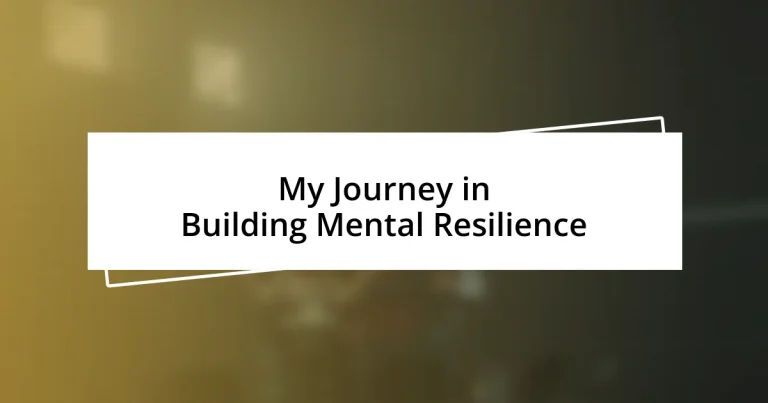Key takeaways:
- Mental resilience is a skill that can be cultivated through challenges, enabling personal growth and emotional stability in difficult situations.
- Building resilience involves developing adaptability, emotional strength, and maintaining connections, which enhances one’s ability to navigate life’s uncertainties.
- Practicing mindfulness, self-care, and engaging in reflective practices like journaling are crucial techniques that strengthen resilience and promote personal growth.
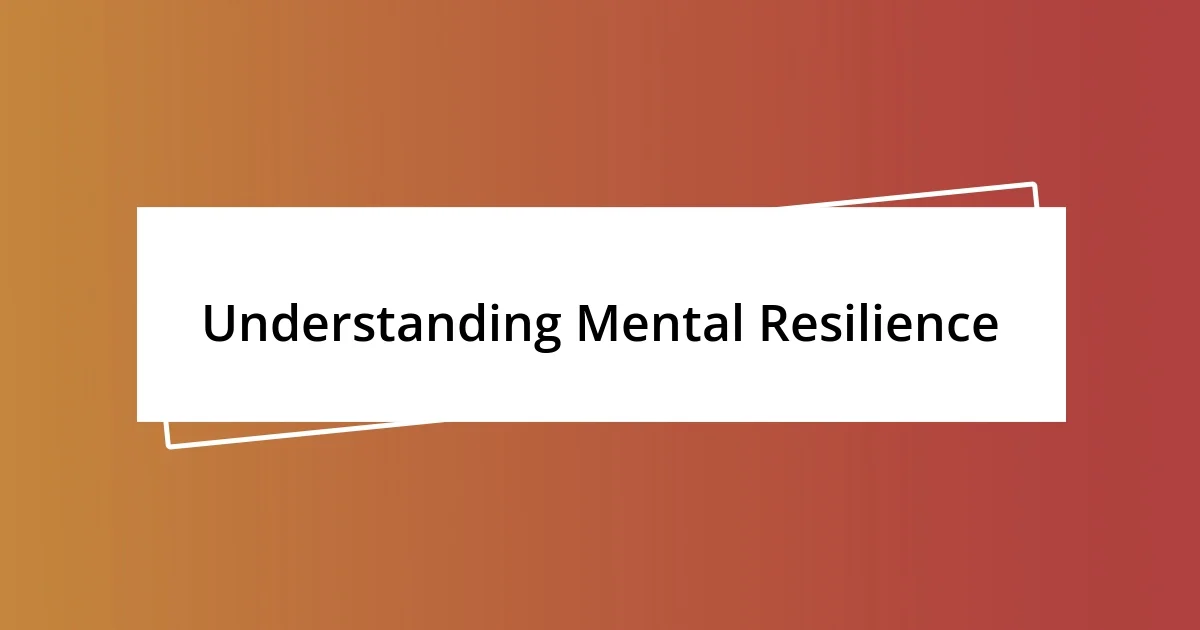
Understanding Mental Resilience
Mental resilience is the ability to bounce back from challenges and maintain emotional stability in difficult situations. I remember a time when I faced significant setbacks at work. It was overwhelming, and I felt like I was drowning in self-doubt. In those moments, I had to ask myself: What can I learn from this? This query helped me shift my focus from the pain of the experience to the potential growth it offered.
At its core, mental resilience is about adapting to adversity and learning from it. I’ve discovered that it’s not a fixed trait but rather a skill we can cultivate. Imagine standing at the edge of a storm after a tornado has passed—what remains is a chance to rebuild. This sense of renewal, even after hardship, resonates deeply with me and encourages me to embrace challenges as opportunities.
Understanding mental resilience also means recognizing that it’s perfectly normal to feel vulnerable at times. On particularly tough days, I let myself feel that vulnerability instead of pushing it away. I found that acknowledging my feelings not only lightened my emotional load but also paved the way for healing and growth. Isn’t it interesting how embracing our struggles can ironically make us stronger?
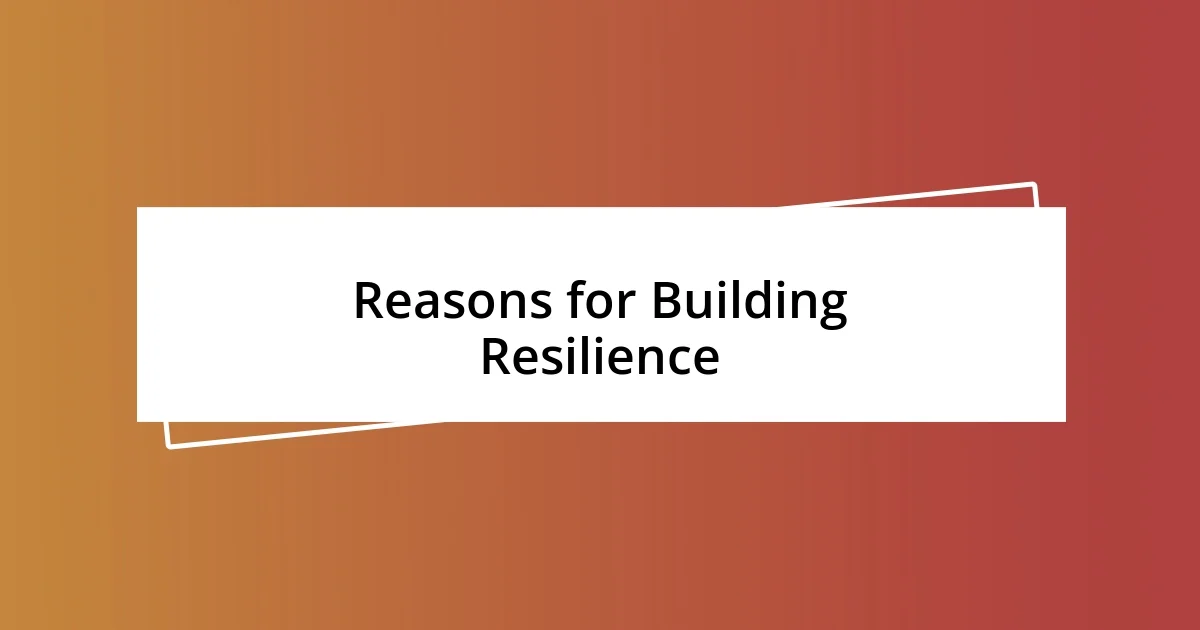
Reasons for Building Resilience
Building resilience is essential because it helps us navigate life’s inevitable ups and downs. I often reflect on my own experience during the pandemic when everything felt uncertain. My mental resilience was tested in ways I never anticipated, and I quickly realized that building this resilience wasn’t just beneficial, it was necessary. With a strong foundation, I could face challenges head-on instead of feeling paralyzed by fear or anxiety.
Here are some reasons why I believe building resilience is crucial:
– Adaptability: Resilience allows us to adapt to change and uncertainty, enabling us to respond more effectively.
– Emotional Strength: It helps in managing our emotions, which means I’m less likely to succumb to overwhelming feelings in tough situations.
– Growth Mindset: With resilience, I see challenges as opportunities for growth rather than as insurmountable obstacles.
– Improved Relationships: It bolsters my ability to connect with others during tough times, fostering stronger support systems.
– Better Decision-Making: Resilience enhances my capacity to make thoughtful decisions under pressure, preventing hasty choices driven by fleeting emotions.
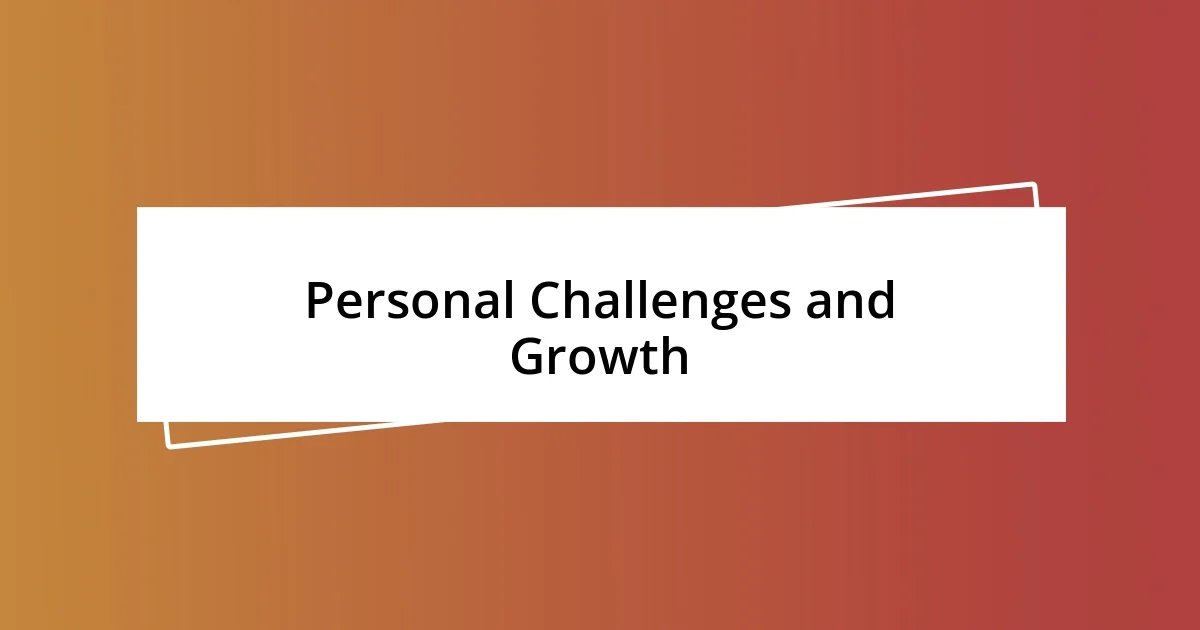
Personal Challenges and Growth
Personal challenges often seem daunting at first, but I’ve learned they can also be powerful catalysts for growth. One time, I faced personal losses that left me feeling utterly alone. As days turned into weeks, I realized that to honor those I lost, I needed to allow myself to grieve, but also to find new purpose. This duality of pain and motivation became a turning point in my journey toward mental resilience. It taught me that vulnerability can lead to immense strength.
Sometimes, overcoming challenges requires facing uncomfortable truths about ourselves. I remember a particularly difficult conversation with a close friend where I had to admit my own shortcomings. Initially, I dreaded the confrontation, fearing it would strain our relationship. Instead, it opened a door to deeper understanding and connection between us. That moment of honesty not only strengthened our bond but also led me to commit to personal growth in those areas. It was a lesson in humility.
Reflecting on my path, I see how every challenge wrapped itself in a lesson. Some days, I felt like I was walking uphill against the wind, yet each step built my mental resilience. For instance, when I lost a job unexpectedly, it shook my confidence. Yet, it also pushed me to explore new opportunities I’d overlooked before, unveiling hidden passions that reignited my motivation. Challenges taught me that sometimes we must look beyond what we’re used to, and that’s where true growth happens.
| Personal Challenges | Growth Outcomes |
|---|---|
| Loss | Finding purpose and strength through grieving |
| Honesty | Deeper connections and commitment to personal growth |
| Job Loss | Exploring new opportunities and reigniting motivation |
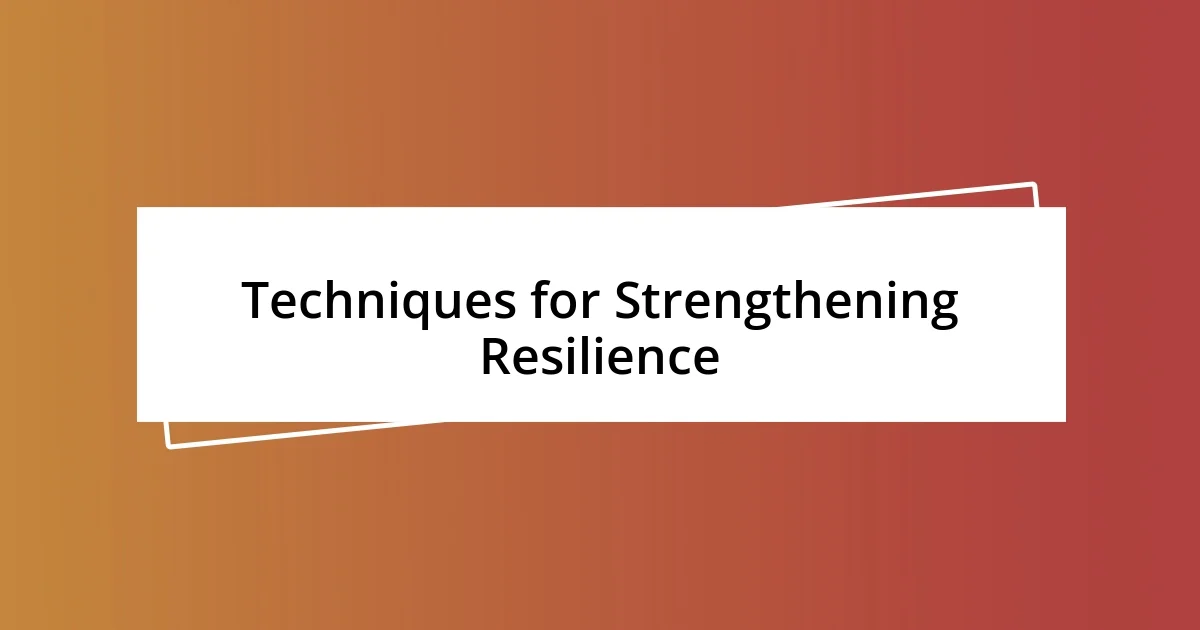
Techniques for Strengthening Resilience
Practicing mindfulness has been a game-changer for my mental resilience. I remember when I first tried meditation; my racing thoughts felt so overwhelming. But as I made it a daily habit, I discovered that just a few minutes of focused breathing could clear my mind and center my emotions. It’s amazing how this simple technique helps me regain control, especially when life feels chaotic.
Another technique I’ve found beneficial is building a strong support network. There have been times when I felt isolated, trapped in my thoughts and worries. Reaching out and sharing my experiences with friends or family often lifted that weight off my shoulders. Don’t you think there’s something powerful in knowing we’re not alone in our struggles? This connection fosters understanding and reminds me that vulnerability is a key part of resilience.
Engaging in regular physical activity is another cornerstone of my resilience toolbox. I’ll never forget the day I decided to go for a run after a particularly tough workweek. With each stride, I felt the stress melting away, replaced by a surge of endorphins. It became clear that taking care of my body had a direct impact on my mental fortitude. Have you ever noticed how much better you feel after a good workout? It’s not just about fitness; it’s about building that inner strength to confront life’s challenges.
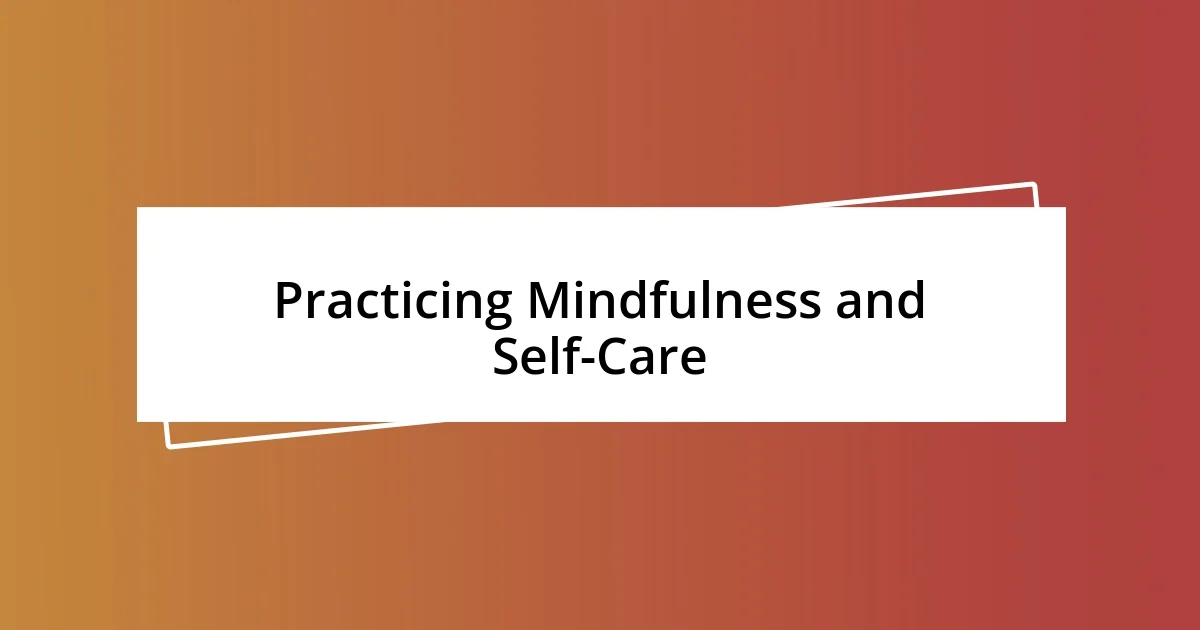
Practicing Mindfulness and Self-Care
Practicing mindfulness and self-care has truly transformed the way I navigate life’s ups and downs. I recall one particularly hectic week where everything felt overwhelming. It was then that I decided to carve out just ten minutes each morning for mindfulness—sipping tea and focusing on my breathing. This small act helped me feel more grounded, as if I was carving out a protective bubble that allowed me to face the day with clarity and calmness.
One memorable instance was after a long day at work that had drained my energy. Instead of plopping down in front of the TV, I chose to indulge in a warm bath filled with calming lavender. As I immersed myself, I could feel the stress just melting away. It’s incredible how something so simple—taking that time for myself—could drastically shift my mood. Have you ever noticed how rare it is to give ourselves permission to unwind? I realized that prioritizing self-care doesn’t just feel good; it actively builds my mental resilience.
Lastly, I found that journaling plays an integral role in my journey. On days when my mind feels like a tangled ball of yarn, jotting down my thoughts has been a lifeline. I remember scribbling my frustrations during a particularly challenging season, and it felt like releasing a pressure valve. I often wonder how many people underestimate the power of putting pen to paper. It’s not just a tool for reflection; for me, it has served as a bridge to understanding my emotions better and honing my resilience through the ups and downs of life.
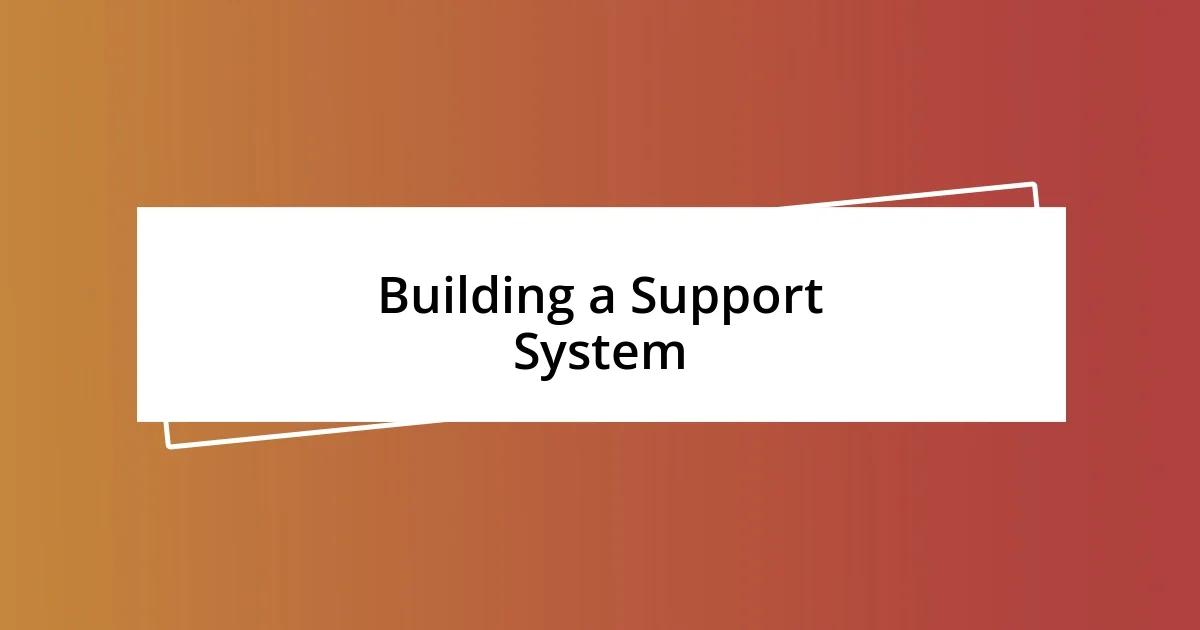
Building a Support System
Building a support system has been one of the most rewarding experiences of my journey. I vividly remember a moment feeling overwhelmed during a rough patch in my life. I decided to reach out to an old friend for a heart-to-heart chat. The relief I felt after just 30 minutes of sharing my worries left me amazed at how much lighter I felt. It’s incredible how simply having someone listen can make such a difference—don’t you think?
Many of us underestimate the value of consistent connections. I make it a point to regularly check in with my close circle, whether through a quick text or a casual coffee date. It’s during these moments that I find not just emotional support but also fresh perspectives. There’s nothing quite like the laughter shared over small joys or mutual commiserations that serve as reminders that we’re navigating similar paths. Have you found your own ways to strengthen those bonds?
Setting boundaries is also crucial for a healthy support system. I learned this the hard way when I took on too much emotional labor from friends. I found myself drained, and instead of being the support they needed, I felt like a burden. So, I began to prioritize my emotional space and communicate openly about what I could handle. This shift not only benefited me but also encouraged my friends to be more proactive in seeking their own support. Isn’t it interesting how fostering healthy relationships often means caring for ourselves first?
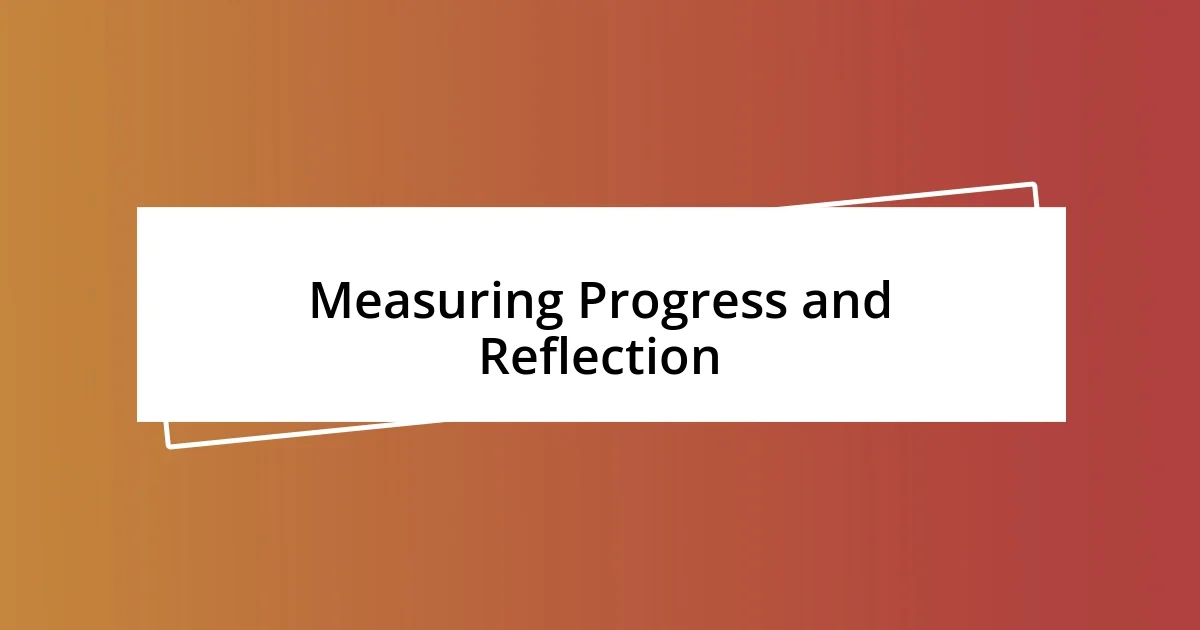
Measuring Progress and Reflection
Measuring progress in building mental resilience is something I’ve approached through personal reflection and concrete milestones. I remember setting aside a specific time each month to revisit my journaling entries. By comparing where I was emotionally to where I am now, I realized how far I’ve come. Can you think of a moment when reflecting on your past helped you realize your own growth?
At times, I’ve created simple checklists to quantify my progress. When I introduced practices like mindfulness and reaching out for support, I noted how often I engaged in these activities. Interestingly, the more I check these boxes, the more motivated I feel to maintain them. It’s almost as if seeing my progress visually reshapes my mindset—how do you capture your own advancements?
The act of reflection has often become a gentle mirror for me. There are days when I wasn’t sure if I was making any headway at all until I paused to think, sometimes with a cup of tea in hand, and acknowledged my struggles and triumphs. It’s like standing on a shore; when I look back at the steps I’ve taken, I see the path I’ve traversed. This introspection not only deepens my understanding of resilience; it fuels my determination to keep moving forward. Have you found your own little ritual for reflection?












